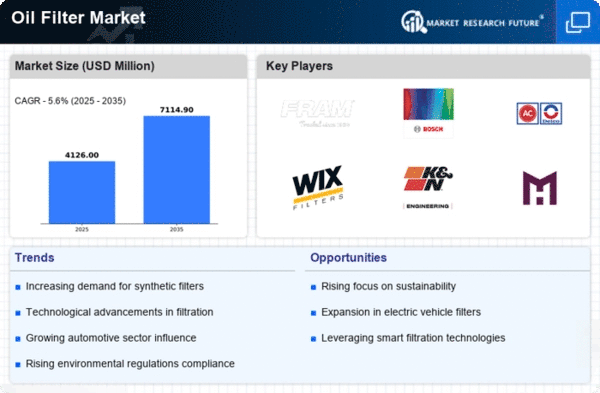Market Share
Oil Filter Market Share Analysis
The oil filter market has experienced notable trends in recent years, reflecting the evolving landscape of the automotive and industrial sectors. One prominent trend is the growing demand for eco-friendly and sustainable oil filter solutions. With an increasing emphasis on environmental consciousness, manufacturers are developing filters that are not only efficient in trapping contaminants but also employ eco-friendly materials in their construction. This shift is driven by both consumer awareness and regulatory pressures to reduce the environmental impact of automotive and industrial operations.
Another key trend in the oil filter market is the rise of smart and connected filters. The advent of Industry 4.0 technologies has infiltrated various industries, and the oil filter market is no exception. Smart filters are equipped with sensors and connectivity features that enable real-time monitoring of filter performance. This connectivity allows for predictive maintenance, as the filters can communicate their status and efficiency to a centralized system. This proactive approach enhances overall equipment efficiency, reduces downtime, and lowers maintenance costs for end-users.
Moreover, the market has witnessed a surge in the demand for high-performance oil filters. As industries become more demanding and sophisticated, the need for filters that can handle higher temperatures, pressures, and contaminants has escalated. High-performance filters contribute to the longevity of machinery and engines, offering enhanced protection against wear and tear. This trend is particularly evident in the automotive sector, where advanced engines and stringent emission standards drive the adoption of premium filters to ensure optimal engine performance.
Additionally, the oil filter market is experiencing geographical shifts in terms of demand and production. Emerging economies, particularly in Asia-Pacific and Latin America, are witnessing robust growth in automotive and industrial activities. This has led to an increased demand for oil filters in these regions. Manufacturers are strategically expanding their production facilities and distribution networks to capitalize on these opportunities and cater to the growing market in these regions. The globalization of supply chains has become a prominent aspect of the oil filter market as companies seek to establish a strong presence in key growth markets.
Furthermore, the focus on research and development has become a pivotal factor in the oil filter market. Manufacturers are investing in innovative technologies to design filters that not only meet current industry standards but also anticipate future requirements. This includes the exploration of advanced filtration materials, nanotechnology applications, and sustainable manufacturing processes. R&D efforts are aimed at developing filters that offer superior performance, durability, and environmental sustainability, aligning with the evolving needs of end-users and regulatory standards.
In conclusion, the oil filter market is undergoing dynamic changes driven by environmental considerations, technological advancements, and shifting global demands. The industry is witnessing a transition towards sustainable and smart filter solutions, with an increasing focus on high-performance and innovative products. As the automotive and industrial sectors continue to evolve, the oil filter market is poised to adapt to these changes, presenting opportunities for growth and development in various regions across the globe.


















Leave a Comment